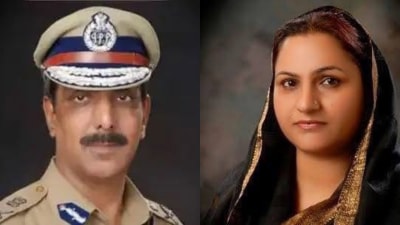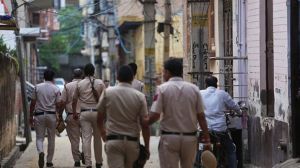We regret (that) procedures of verifying scientific evidence were not followed…but the point is glaciers are receding
With the row on glaciers,the heat is on R.K. Pachauri,TERI chief and IPCC chairman. In this Idea Exchange moderated by Special Correspondent Amitabh Sinha...
With the row on glaciers,the heat is on R.K. Pachauri,TERI chief and IPCC chairman. In this Idea Exchange moderated by Special Correspondent Amitabh Sinha,Pachauri speaks of Copenhagen and answers questions on whether the controversy has dented IPCCs image
AMITABH SINHA: IPCCs claims on glacier melt,and specifically,that the Himalayan glaciers would disappear by 2035,have been found to lack concrete scientific evidence. What does this mean for the credibility of IPCC?
In this one instance,the well-laid down procedures of verifying scientific evidence were not properly followed and we regret that. But this cannot be the basis of questioning the credibility of IPCC. IPCCs credibility remains as intact as ever. The broader point that the glaciers have been receding is unchallenged.
AMITABH SINHA: What action does IPCC contemplate against the scientists who did not follow the procedure? And what happens next?
Well,we are not planning any action against the scientists concerned. That doesnt serve any purpose. But this episode should be a reminder to everyone else associated with IPCC reports to be extra careful in making their scientific assessments and reaching conclusions. As for the 2035 date,it cannot be retracted from the fourth assessment report. But we have put out a rejoinder explaining the correct status quite prominently on the website so that no one who accesses the fourth assessment report from our website misses out on the clarification. The two have to be read together. When the fifth assessment report comes out,it will carry the correct assessment of the state of the Himalayan glaciers based on the available scientific evidence by then.
AMITABH SINHA: The discourse on climate change has shifted from the scientific sphere to the political and economic. What are the lobbies influencing the discourse?
The actions to meet the climate change challenge effectively would require change in almost every sphere of life and in every sector of the economy. This would be seen as a threat by some who have become comfortable benefiting from the status quo. Governments,particularly in democratic societies,are largely concerned with winning elections. Anything that requires a long term perspective in terms of identifying the problem and mounting efforts to meet it,are relegated to a lower level of priority. The kind of political resistance or political inertia you see is inevitable. The only way to overcome it is for people to realise the seriousness of the problem and understand what it means for their children. Climate change threatens some in the infrastructure sector. Former US president George W. Bush mentioned how Americans are addicted to oil. If any government tries to tax gasoline to reduce this addiction,I am not sure the public will accept it. There is enormous inertia and therefore,in-built opposition to change. People resist it.
DHIRAJ NAYYAR: There is huge money involved in the carbon trading business. What is your view on carbon trading and a carbon tax?
It is for a society to decide whether it prefers a tax. In Europe,you have a combination of both. You have an emissions trading system,you also have heavy taxes on carbon and carbon-based fuels. In the US,taxation and public spending,no matter how meritorious,is seen as an evil. Politically,a cap on trade would be more acceptable than a tax. I see no alternative to trading,particularly in the EU where different countries are at different stages of development. The important thing is that a project funded by any of these measures should not create any distortions. It should result in a net reduction of emissions and it must promote benefits to the local community.
DHIRAJ NAYYAR: Can organisations promoting climate change,like TERI,also be involved in the business of carbon trading?
I am adviser to the Chicago Climate Exchange and neither I nor TERI get a single penny from that association. An organisation like TERI or even IPCC provides scientific inputs to every organisation. We have created a scientific assessment on climate change. For it to be useful to people who can implement measures,you have to give them information and advice and this would include corporates,governments and civil society. If somebody is carrying out carbon trading,then so be it.
The IPCC,TERI and I get no benefits from these consultations. I provide advice to a lot of organisations and I am happy about that. An organisation like Deutsche Bank pays for my services,but it pays the institute,not me. What is the purpose of acquiring knowledge unless you facilitate its utilisation in the right direction? I would be very dishonest if I came up with an assessment which clearly shows that the world has to reduce the emissions of greenhouse gases as rapidly as possible and when I get an opportunity to advise an organisation on this,I refuse. There is no ownership of intellectual property rights as far as IPCCs work goes.
AMITABH SINHA: You are one of the most visible of climate change activists. Does that open you up for a lot of personal attacks,the kind of what we saw recently in The Daily Telegraph? Is that a problem?
Somebody gave me a piece of advice which I believe in firmly: if you cant take the heat,get out of the kitchen. The fact is,I am visible,I am vocal and I am going to be even more so. If that attracts the kind of nonsense,the kind of underhand lies that people pitch against me,I am prepared to take it. I have no hesitation in continuing with what I am doing. I believe society is enlightened and intelligent enough to be able to separate the truth from falsehood. When it comes to pursuing what I believe in,I am a fighter to the end. I will not stop.
DHIRAJ NAYYAR: Is there is a certain amount of resentment in the West that you are a person from an emerging economy? Do you think they attribute motives to that?
In our fifth assessment report,we are going to look at the ethical dimensions. Some people maybe disturbed by that. The outline of the fifth assessment report is up on our website and if it causes discomfort,I feel encouraged that I am succeeding in doing what I should be doing. It maybe galling to some people. There is a huge effort,particularly in the USA,to stop any legislation or any policy that might result in action on climate change. One report by a think tank shows that there are more than 1,200 lobbyists currently in Washington DC who are being supported by 770 companies to stop action on climate change. So there is a huge amount of money going into this. I am not surprised that people would attack the science of climate change,attack the IPCC. What more effective way of doing that than to attack the IPCC chairman even if it involves lies?
COOMI KAPOOR: TERI was founded by the Tatas. You have retained the acronym even if you have changed the wording. Doesnt this create a conflict of interest since the Tatas,as a major manufacturer,is bound to be a polluter?
About two years ago,I was asked by the media what I thought of the Nano car. I replied that I get nightmares. We are proud that the seed money for TERI came from the Tata Group. I have the highest regard for JRD Tata who set up these institutions. We are proud of being a part of institutions that have excelled in everything they have done. But we have maintained a scrupulous distance from the Tata Group and we dont get any support from them; we havent for several years. We kept the acronym TERI because we had already become known as TERI. We have never had any conflict of interest. But we do work with the corporate sector. If we want to bring about change,we cant say we will live in an ivory tower and we are going to stay away from the evil corporate sector. The corporate sector is really what is going to bring about change.
DHIRAJ NAYYAR: Do you think it is a problem that some TERI people are on the Indian climate change negotiating team and you are also receiving money from people you are advising?
I dont see a conflict because the persons from TERI on the Indian negotiating team are pretty much hardliners. They are not going to be swayed by anything,not even by people in political authority. I am proud of the fact that everybody in TERI expresses his/her views according to the dictates of their own conscience. The only reason why TERI has reached where it has is because people have enormous academic freedom.
Neha Sinha: In the light of criticism of the previous assessment reports,the most recent on the melting of the Himalayan glaciers,are you incorporating changes in the 5th Assessment report?
I think it is tragic and very short-sighted not to have a major programme of research on glaciers. We have so much at stake in understanding what is happening to the glaciers and if you count the number of glaciologists in this country,they do not go beyond the fingertips of the human hand. We need to step up measurement,we need to step up recording of what is happening to the glaciers. In that area,we are deficient in terms of data. But on the basis of all the information that is available even anecdotal evidencethere is no getting away from the fact that our glaciers are melting very rapidly.
DHIRAJ NAYYAR: What is the future of alternative fuels like ethanol given the controversy over the food crisis as a result of diversion of crops?
We have to be very careful in the choice of technologies,the choice of raw material that is will go into ethanol. What North America is doing is certainly not the answer because they have diverted a huge quantity of corn to produce ethanol and there are all kinds of subsidies and hidden benefits. What would work best in providing solutions through bio-fuels would be to grow plants in areas where there is no competition with food crops. With bio fuels,we must be very careful. You have to look at the implications of using specific raw materials and the conversion technology in it.
AMITABH SINHA: Do you think that cutting our emission intensity or the emissions per unit of GDP,as we announced before Copenhagen,is good enough?
I dont think we can do more than that,given that our per capita emissions are very low. Our per capita consumption of energy is so low,we still have 400 million people who have no electricity in their homes and 90 per cent of our rural population still uses inferior bio-mass for cooking purposes. We have no choice but to increase our consumption of fossil fuels.
AMITABH SINHA: Just ahead of the Copenhagen Summit,e-mails of some IPCC scientists were hacked and the contents revealed attempts by those scientists to exaggerate the adverse effects of climate change. You had promised an inquiry into the episode. What has it revealed?
I had said we will look into it. We set up a team within IPCC of the co-chairs of the working group. These are all newly elected officials,they had no association with the third assessment report in positions of responsibility. We have had those e-mails examined. The papers the e-mails reportedly said would be excluded were included in the fourth assessment. The scientists are absolutely outstanding,their record has been superb. I think they were indiscreet and to some extent immature to exchange e-mails of this nature. But we need to look at who financed this theft of e-mails. I believe Scotland Yard is looking into it. The University of East Anglia has set up an enquiry commission. I have some interim feedback from there which clearly shows that what was threatened to be done in these e-mails was not done at all. Our own internal efforts reveal that nothing that distorts the process or procedures of the IPCC was done at all. It was basically hyped up. The timing was extremely significant,they wanted to derail the negotiations in Copenhagen
DHIRAJ NAYYAR: What are you doing to reduce your carbon footprints? How serious is the argument in favour of being vegetarian?
I consider it very serious. In our fourth assessment report,for the first time,we highlighted the importance of lifestyle changes as a mitigation option. I am not saying everybody should become a vegetarian but todays global meat industry is factory farming in a sense. You clear huge areas of land of forests and then you have cattle or other livestock grazing on it. They let off methane emissions. They are not feeding themselves on grass,or whatever grows naturally but cereals. Those cereals are produced by very intensive agricultural methods. When the livestock is killed,they have to be refrigerated. Often they are transported thousands of miles away. The emissions associated with this are huge. I tell people,reduce your meat consumption,you will be healthy and so would the planet. I have become a vegetarian because of a variety of reasons but certainly because of environmental issues. On my own carbon footprint,my record is not very good because I travel so much. In my daily life,I try to minimise my energy consumption as much as possible. But it is not enough
TEENA THACKER: How serious do you think is the government on climate issues given that chloro fluoro carbons were to be phased out by January 2010 and they have asked for an extension for next three years?
I think the government is very serious. The fact that the Prime Minister has been engaged in this,has set up the advisory council on climate change and has also announced the national action plan on climate change clearly shows the commitment of the government.
Transcribed by Sweta Dutta



- 01
- 02
- 03
- 04
- 05




























